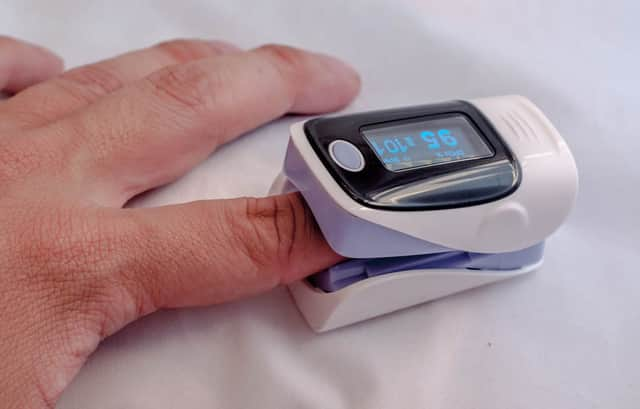At-home oxygen level checkers are now available for high risk Covid patients in England


High risk Covid patients recovering at home in England are eligible to receive a potentially life-saving gadget to monitor their oxygen levels.
Under a scheme called Covid Oximetry@home, people aged 65 or over, anyone with a clinical vulnerability or anyone doctors are worried about will be offered a pulse oximeter - a small device that measures levels of oxygen in the blood.
Advertisement
Hide AdAdvertisement
Hide AdOne of the dangers of coronavirus is that it causes levels of oxygen in the blood to drop dramatically without a patient noticing. Often, this results in a patient going to hospital too late to be treated effectively, sometimes leading to their death.
How does a pulse oximeter work?
Normally, oxygen levels should be around 95 to 100 per cent, but some patients with coronavirus are presenting at hospital with levels in the 70s and 80s.
As a result, Oximetry@home was piloted last year in Tees Valley, Slough and North West London, and is now being rolled out across England to high-risk patients with coronavirus.
High risk patients who contract coronavirus are provided the oximeters by their GP, who will then keep in touch to monitor them while at home with the illness.
Advertisement
Hide AdAdvertisement
Hide AdThe patients use the pulse oximeter to measure their oxygen saturation levels three times a day.
The machine clips onto a patients finger and shines a light into the body. It calculates oxygen levels by measuring how much of the light is absorbed.
The patients then record their results using a smartphone app, web portal or paper diary. If the oxygen level drops below 93 or 94 per cent, people should then call 111 or speak to their GP. If levels drop below 92 per cent, they should call 999 or attend A&E.
Dr Matt Inada-Kim, the national clinical lead for the Oximetry@home programme, told the BBC: "The point of this whole strategy is to try to get in early to prevent people getting that sick, by admitting patients at a more salvageable point in their illness."
Advertisement
Hide AdAdvertisement
Hide AdWhile he said there isn't yet definitive proof that the gadget saves lives, early signs suggest that the monitors increase survival rates.
"What we think we can see are the early seeds of a reduction in the length of stay after a hospital admission, an improvement in survival and a reduction in the pressures on the emergency services," Dr Inada-Kim said.
He and other doctors have suggested that those who wouldn't be eligible for free oximeters through the scheme should consider buying one in case they contract coronavirus - with the gadgets costing around £20 online.
So far, NHS England has supplied around 300,000 pulse oximeters to patients at home under the scheme.